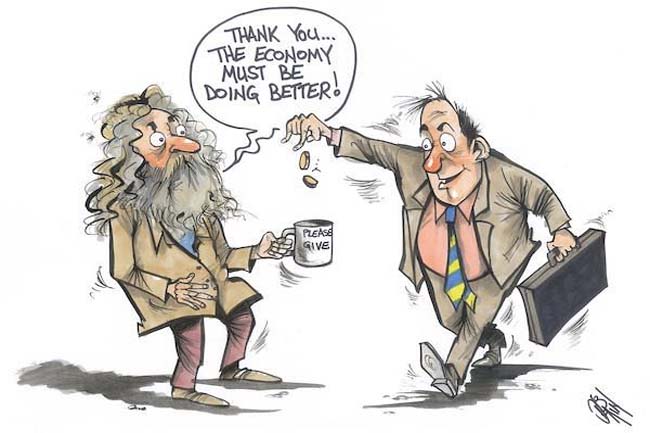Pressuring the ABC for the removal of Alberici's tax cuts article amounts to unjustified censorship by the Turnbull Government, whether or not its premise is correct, writes Dr Steven Hail.
AUSTRALIAN POLITICIANS of a certain age were brought up watching the British political comedy Yes Minister on the ABC.
Perhaps we shouldn’t be surprised, then, that they so often seem to be acting out one of its scripts.
Who can forget the episode in which government minister Jim Hacker and his chief bureaucrat, Sir Humphrey, pressured and intimidated the BBC into suppressing a story the honourable Jim found to be an embarrassment?
In the episode, the BBC’s director of planning did exactly as he was told, all the while maintaining that “the BBC couldn’t possibly give in to government pressure”.
Fast forward nearly 40 years and moving into the real world – if Canberra can be so described – and Prime Minister Malcolm Turnbull and Treasurer Scott Morrison have done a more than passable impression of Jim and Humphrey. Sir Humphrey was subtler about it than Scott and Malcolm but he was a British civil servant, after all.
The journalist who upset the PM was the usually conservative (small "c") Emma Alberici of all people — hardly a socialist firebrand. In a piece posted on the ABC site on 14 February, she pointed out that giving large companies an income tax cut might not be an effective way of boosting wages.
Alberici went on to point out that some of our largest companies hardly pay corporate income tax at all, that the maximum corporate tax rate is a relatively minor factor in influencing investment decisions by multinationals and that Australia’s average corporate tax rate is low, compared to those in other G20 countries. She also included that our effective marginal rate (the rate paid on additional investments which are just about profitable) is also low and that many of the benefits of such a tax cut in Australia flow to foreign shareholders as a result of Australia’s dividend imputation system.
All the above is fair commentary. Strangely, another ABC journalist, Ian Verrender, said much the same thing as Alberici only last October, but without the fanfare. What is more, they both used the same data – from the Congressional Budget Office in Washington DC, no less – to back up their arguments. Verrender’s article is still up on the site as I write.
There is one point where Malcolm Turnbull was (sort of) on the money in his criticism of the Alberici article. He claimed that she doesn’t understand the tax system. He is right. The trouble is, he doesn’t understand the tax system either. Neither of them has any idea about the real macroeconomic purpose of taxation. They think Federal taxes pay for things. Taxes do not pay for anything. They limit total spending in the economy and so help to prevent inflation. The Government doesn’t need its money from us before it can buy things. It is the other way around.
Government spending puts more money into the private sector, taxation takes some of that money out of circulation again. Taxes do not pay for public services, those services are paid for when politicians authorise spending new money on them. The Australian Government, given the nature of our monetary system, cannot run out of the Australian dollars its central bank creates. The Reserve Bank of Australia will never "bounce" a government "cheque".
As for corporate income tax – and you might be surprised to see me making this argument if you are aware that I am normally viewed as a "lefty" – there is a good argument for eliminating it entirely. It is complex and costly to collect. It leads to endless arguments about tax-shifting, gives the directors of large corporations even more prominence in our national discourse than they otherwise would have and, as Alberici points out, many of the biggest companies pay little or no tax in any case.
I am by no means the first progressive to argue that we might be better off without a tax on corporate income. Hyman Minsky made the same point, many years ago.
In the end, people pay taxes — companies don’t. It would be more straightforward to switch to a more progressive system of personal income taxes for domestic residents. If you want – in the interest of equity – to have a withholding tax on dividends paid to foreign residents, that is up to you. Those taxes won’t "pay for" anything.
Emma Alberici is completely wrong to think that a government budget surplus is a desirable fiscal outcome and that the government cannot "afford" to cut corporate income taxes because it is running a deficit. This is against the principles of modern monetary theory.
The only part of Alberici’s article that Malcolm Turnbull would agree with is the part which is incorrect. Turnbull might look favourably on the notion that corporate income taxes could be scrapped but for all the wrong reasons. He certainly would not favour a substantial increase in the top marginal tax rate to avoid this policy having inflationary implications.
Both think the Government can run out of its own currency. Neither of them understands the macroeconomic purpose of taxation. Both imagine that the Government should aim to run a fiscal surplus – not knowing that this is identical to a non-government deficit – and a recipe for growing household financial fragility and a possible recession. Neither has learned from the Howard years or the Global Financial Crisis. Both talk to the wrong economists.
Neither of them is aware of the work of Professor Stephanie Kelton – the former chief economist on the Senate Budget Committee in Washington DC – or of Professor William Mitchell, the director of the Centre of Full Employment and Equity in Newcastle, NSW. Or, of the late Hyman Minsky, for that matter.
This was a case of one person who doesn’t understand the monetary system disliking an article written by another person who doesn’t understand the monetary system. That first person is the Prime Minister of Australia. But there was no cause for Malcolm Turnbull, Scott Morrison, Minister for Finance Mathias Cormann and Communications Minister Mitch Fifield to lean on the ABC Managing Director Michelle Guthrie to get the – admittedly imperfect – article taken down. This was naked censorship without justification.
'Any suggestion the ABC is responding to outside pressure over these stories is incorrect,' said Sally Jackson, Media Manager, ABC News.
Isn’t that right, Sir Humphrey?
Yes, Minister.
Cue the theme tune.
You can read more by Dr Steven Hail at erablogdotcom, follow him on Twitter @StevenHailAus, as well as on Facebook at Green Modern Monetary Theory and Practice.

This work is licensed under a Creative Commons Attribution-NonCommercial-NoDerivs 3.0 Australia License
Monthly Donation
Single Donation
Get the detail. Subscribe to IA for just $5











